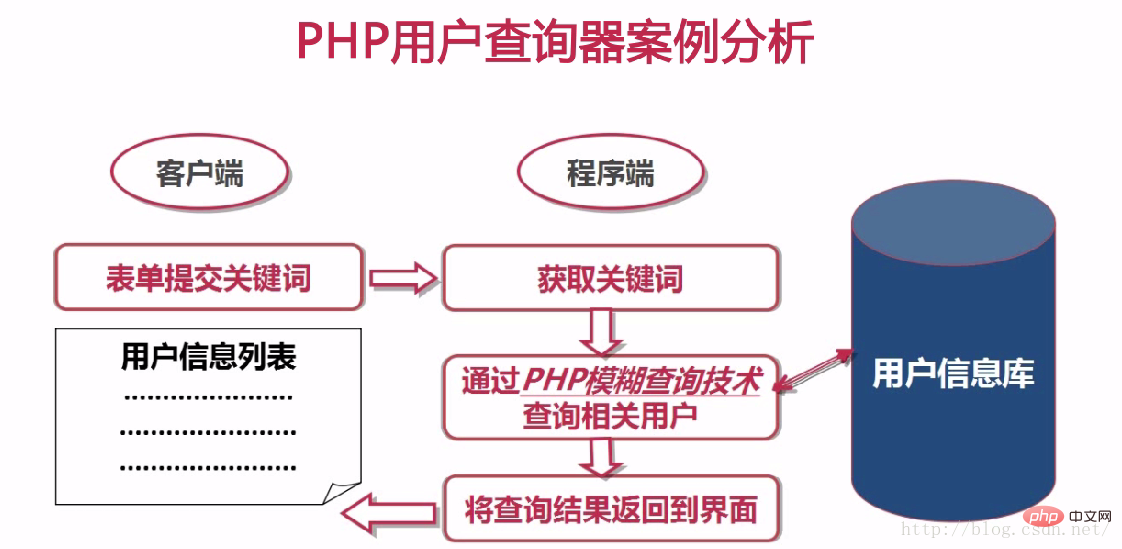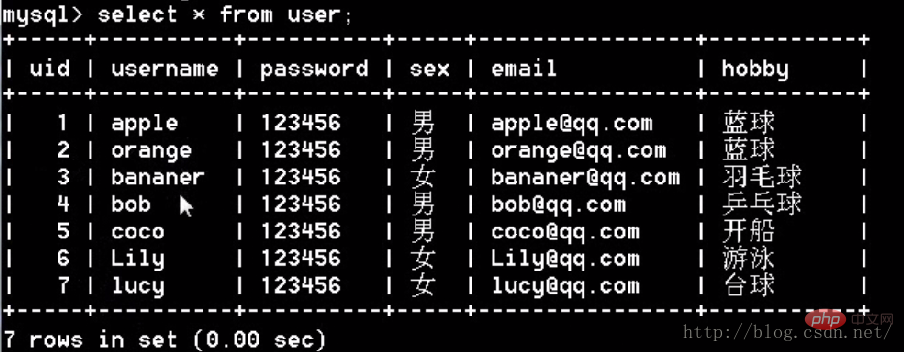How to perform fuzzy query in PHP
Fuzzy query method: 1. Use SQL matching pattern, and the operator uses "LIKE" or "NOT LIKE". When matching, it is not case-sensitive; 2. Use regular expression matching pattern, and the operator uses "REGEXP" or "NOT REGEXP", the regular expression can appear anywhere in the matching field.

The operating environment of this tutorial: windows7 system, PHP7.1&&mysql8 version, Dell G3 computer.
When building a website, we often use the function of using keywords to find certain resources on the website. At this time, we often need to use fuzzy queries. Today I learned PHP fuzzy query, now let’s summarize it.

The above is the flow chart of fuzzy query.
In order to facilitate demonstration, a simple database table needs to be created.

KEY ‘username’(‘username’) is the index, very important.
Benefits of Index: If you retrieve data according to a certain condition, if the condition field is not indexed, the entire table will be traversed during the query. If you create an index, the query will Then the query will be performed based on the index, thereby improving query performance.
Precise query
The returned result is one and only one SQL query
Application scenario: User registration Login
Fuzzy query
Return The result is uncertain
Application scenario: Site search
Note: The results returned by the above two queries may be empty.
Fuzzy query technology supports 2 matching formats: 1.SQL matching mode (the most commonly used one in development); 2. Regular expression matching mode (not recommended)
SQL matching mode
1. When using SQL matching mode, you cannot use the operator = or !=, but use the operator LIKE or NOT LIKE;
2. Using SQL matching mode, MYSQL provides 2 types of wildcard characters. % represents any number of any characters (including 0) _ represents any single character;
3. Use SQL matching mode, if the matching format does not contain any of the above two wildcard characters. The query effect is equivalent to = or !=;
4. Use SQL matching mode, which is case-insensitive by default.
Five query scenarios
① #Query users whose username starts with a certain character
#Query users whose username starts with the character 'l'
# l%
SELECT * FROM user WHERE username LIKE 'l%';


② #Query the username with a certain character Users ending with
#Query users whose username ends with a certain character 'e'
#%e
SELECT * FROM user WHERE username LIKE '%e '; 
③#Query users whose username contains a certain character
#Query users whose username contains the character 'o'
# % o%
SELECT * FROM user WHERE username LIKE '%o%'; (Commonly used)


##⑤#Two wildcard characters Use in combination
#Query users whose second character is o
# _o%
SELECT * FROM user WHERE username LIKE '_o%' ;

Regular expression matching pattern (deprecated)
Wildcard
. Match any single character
* Match 0 or multiple characters in front of it
# x* indicate the x character that matches any quantity
[. .] Any character that matches the brackets
[abc] matching character A b or c
## [A-Z] matching any letter [0-9] matching any number[0-9]* match any number of any number
[A-Z]* match any number of letters
^ It means a character or string start
^a means it starts with the letter a
$ means it ends with a certain character or string
s$ means it ends with the letter s
Use regular expression matching pattern Operators used
REGEXP or NOT REGEXP(RLIKE or NOT RLIKE)
If you use a regular expression to match, the pattern is different from the SQL pattern
Explanation: As in the following example
#Query users whose username starts with the character l
SQL Match pattern l%
Regular expression ^l
SELECT * FROM user WHERE username REGEXP '^l';

#Query users whose username is exactly 3 characters
SQL matching pattern ___
Regular expression... ?Is this so
SELECT * FROM user FROM username WHERE username REGEXP '...';

Why are all users queried? Because a regular expression matches a pattern, the pattern matches if the regular expression appears anywhere in the matching field. So... matches usernames containing three letters or more, and all usernames in the table match, so all users are queried.
Note: If you only use the wildcard character . to match, there are N wildcard characters. Then the matching mode means that it is greater than or equal to N characters. If you want to express the exact number of characters, the format is as follows: ^...$
SELECT * FROM user WHERE username REGEXP '^...$';

Recommended learning: php video tutorial
The above is the detailed content of How to perform fuzzy query in PHP. For more information, please follow other related articles on the PHP Chinese website!

Hot AI Tools

Undresser.AI Undress
AI-powered app for creating realistic nude photos

AI Clothes Remover
Online AI tool for removing clothes from photos.

Undress AI Tool
Undress images for free

Clothoff.io
AI clothes remover

AI Hentai Generator
Generate AI Hentai for free.

Hot Article

Hot Tools

Notepad++7.3.1
Easy-to-use and free code editor

SublimeText3 Chinese version
Chinese version, very easy to use

Zend Studio 13.0.1
Powerful PHP integrated development environment

Dreamweaver CS6
Visual web development tools

SublimeText3 Mac version
God-level code editing software (SublimeText3)

Hot Topics
 CakePHP Project Configuration
Sep 10, 2024 pm 05:25 PM
CakePHP Project Configuration
Sep 10, 2024 pm 05:25 PM
In this chapter, we will understand the Environment Variables, General Configuration, Database Configuration and Email Configuration in CakePHP.
 PHP 8.4 Installation and Upgrade guide for Ubuntu and Debian
Dec 24, 2024 pm 04:42 PM
PHP 8.4 Installation and Upgrade guide for Ubuntu and Debian
Dec 24, 2024 pm 04:42 PM
PHP 8.4 brings several new features, security improvements, and performance improvements with healthy amounts of feature deprecations and removals. This guide explains how to install PHP 8.4 or upgrade to PHP 8.4 on Ubuntu, Debian, or their derivati
 CakePHP Date and Time
Sep 10, 2024 pm 05:27 PM
CakePHP Date and Time
Sep 10, 2024 pm 05:27 PM
To work with date and time in cakephp4, we are going to make use of the available FrozenTime class.
 CakePHP File upload
Sep 10, 2024 pm 05:27 PM
CakePHP File upload
Sep 10, 2024 pm 05:27 PM
To work on file upload we are going to use the form helper. Here, is an example for file upload.
 CakePHP Routing
Sep 10, 2024 pm 05:25 PM
CakePHP Routing
Sep 10, 2024 pm 05:25 PM
In this chapter, we are going to learn the following topics related to routing ?
 Discuss CakePHP
Sep 10, 2024 pm 05:28 PM
Discuss CakePHP
Sep 10, 2024 pm 05:28 PM
CakePHP is an open-source framework for PHP. It is intended to make developing, deploying and maintaining applications much easier. CakePHP is based on a MVC-like architecture that is both powerful and easy to grasp. Models, Views, and Controllers gu
 CakePHP Creating Validators
Sep 10, 2024 pm 05:26 PM
CakePHP Creating Validators
Sep 10, 2024 pm 05:26 PM
Validator can be created by adding the following two lines in the controller.
 How To Set Up Visual Studio Code (VS Code) for PHP Development
Dec 20, 2024 am 11:31 AM
How To Set Up Visual Studio Code (VS Code) for PHP Development
Dec 20, 2024 am 11:31 AM
Visual Studio Code, also known as VS Code, is a free source code editor — or integrated development environment (IDE) — available for all major operating systems. With a large collection of extensions for many programming languages, VS Code can be c






